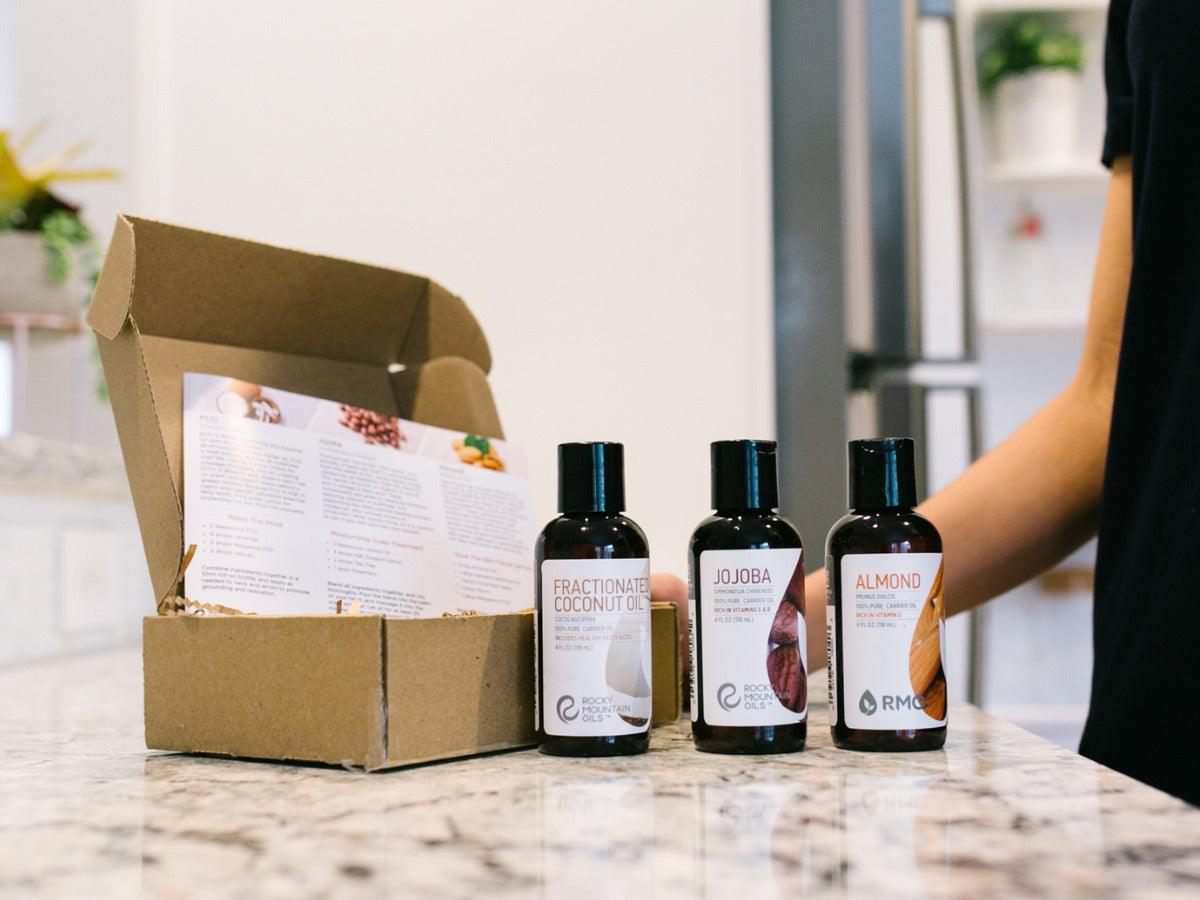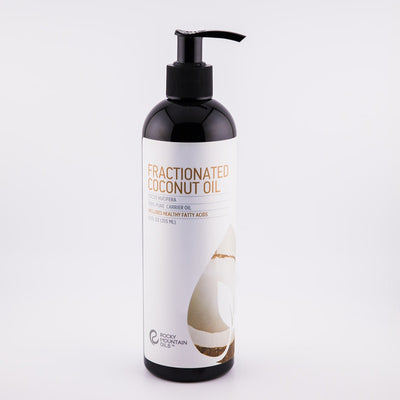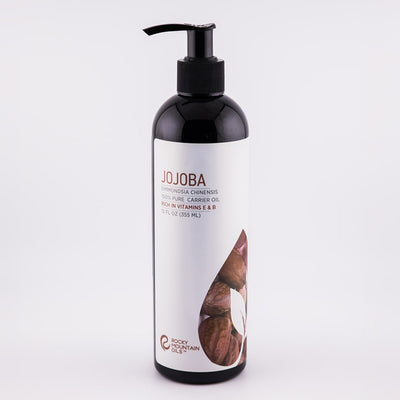Understanding Carrier Oils
Understanding how and when to use carrier oils is integral to practicing essential oil safety!
But what exactly is a carrier oil and how does it differ from regular essential oils?
Carrier oils are such an important tool when it comes to essential oil safety. Carrier oils are necessary to include in your recipes when using essential oils topically, in aromatherapy, in DIY projects, or for skin and hair care. Commonly known as “base” or “fixed” oils, carrier oils are fatty oils that come from vegetables, nuts, or seeds. "Carrier oils" are meant to “carry” essential oils into the body through topical application. Some of our favorite examples of carrier oils are Almond Oil, Fractionated Coconut Oil, Jojoba Oil, Apricot Oil, Avocado Oil, Grapeseed Oil, and Black Cumin Oil.
What is the Difference Between a Carrier Oil and an Essential Oil?
- Carrier oils are different from essential oils in that they are extracted from the fatty portions of a plant, instead of being distilled like essential oils.
- Unlike essential oils, carrier oils are usually odorless or have a very faint, nutty aroma.
- Essential oils are highly volatile and evaporate very quickly. Carrier oils are heavier and do not evaporate; instead, they fully absorb into the skin.
Why Should You Use a Carrier Oil?
People commonly choose to use carrier oils as a way to dilute essential oils for topical application. Don’t worry, though. Carrier oils do not lessen the therapeutic benefits of the essential oils. Instead, they spread essential oils farther on the skin and actually help your body absorb the essential oils faster, which means better therapeutic effects. They are also an important part of practicing essential oil safety. Because essential oils are incredibly potent and concentrated, it’s very important to use a carrier oil to protect the skin when you topically apply any essential oils. Applying essential oils ‘neat’, or without a carrier oil, can potentially cause skin irritation, redness, burning, or even sensitization.
Did You Know That Carrier Oils Have Therapeutic Benefits?
Carrier oils are full of all the good stuff, such as antioxidants, vitamins, and essential fatty acids (EFAs). They are quite beneficial when it comes to nourishing, moisturizing, and protecting the skin. When applied daily, they cann even promote skin cell regeneration and preserve skin elasticity.
What are EFAs?
All carrier oils are made of EFAs. EFAs are essential fatty acids. Your body requires and naturally uses essential fatty acids to stay healthy and to protect your skin regularly. The three main fatty acids are saturated fatty acids, monounsaturated fatty acids, and polyunsaturated fatty acids. Saturated fatty acids cause carrier oils to have a thicker, heavier consistency. These EFAs are great for providing deep moisture and promoting the body's natural healing process. Monounsaturated fatty acids and polyunsaturated fatty acids are thinner in consistency. They also offer a silkier texture that makes them perfect for skin serums. Carrier oils with these EFAs offer wonderful skin-cleansing and age-defying properties.
Key Reasons For Using Carrier Oils With Essential Oils
- Increased absorption into the skin
- Prevention of skin irritation or sensitivity to Essential Oils
- Maximizes the effectiveness of Essential Oils
Essential oils are so concentrated and potent that they are intended to be diluted. Contrary to popular belief, using an undiluted essential oil does not necessarily mean that you will receive better results. Carrier oils prevent essential oils from evaporating while on the skin, which maximizes absorption time. This allows for the aroma of the essential oil to last longer on the skin. Unless you are under the supervision of a trained professional, you should always use a carrier oil with essential oils. With proper dilution rates, you will still receive the maximum benefits from your essential oils. Diluting your essential oils for topical application will also help them last longer, and you will get more applications out of a single bottle.
Rocky Mountain Oils - Carrier Oils
FCO (Fractionated Coconut Oil
This carrier oil is always the go-to for anyone and is the perfect all-around/all-purpose carrier oil. This oil is heat-pressed and has an indefinite shelf life. Many people love Fractionated Coconut Oil because it absorbs well into the skin, has no scent, and doesn’t stain. This oil is great for massage therapists, and for creating essential oil blends. FCO is high in capric and caprylic saturated essential fatty acids. This makes it a great option for protecting the skin without leaving behind a greasy or oily residue.
Jojoba Oil (Simmondsia chinensis)
Pronounced ho-ho-ba, this carrier oil is actually a liquid wax that is extracted by cold-pressing the seeds from the Jojoba desert shrub. Jojoba has a very stable shelf life, like FCO, and doesn’t oxidize or go rancid. This carrier oil is rich in vitamins E and B, and in eicosenoic acid (omega-9), which is a monounsaturated fatty acid. These components are great in retaining moisture, reducing redness or puffiness, and supporting the skin's natural healing process. Jojoba oil is highly penetrating and closely resembles human sebum. While it's great for moisturizing the skin, this carrier oil can also combat excessively oily skin so it is perfect to use in any skin and hair care recipes.
Almond Oil (Prunus dulcis)
Also known as a Sweet Almond Oil, this carrier oil is cold-pressed and has a stable shelf life of 1-2 years. This carrier oil contains very high levels of linoleic (omega-6) essential polyunsaturated fatty acids, oleic (omega-9) essential monounsaturated fatty acids, and vitamins D and E. These fatty acids are known to help retain moisture, reduce redness or puffiness, and nourish and protect the skin from the elements without leaving a heavy or greasy residue. Almond Oil is a wonderful, nourishing oil that is perfect for all skin types, but it is especially great for softening dry skin. It makes a good base for custom face and body care products.
Carrier Oil Variety Pack
Want them all? Get the Carrier Oil Variety Pack and have Jojoba oil, Fractionated Coconut Oil (FCO), and Almond oil all at your disposal!
How do You use Carrier Oil?
Dilution is key when applying essential oils topically. For adults, we recommend starting out with a 2% dilution rate. This means combining 3 drops of essential oil with 1 teaspoon of your choice of carrier oil. You can add your mixture to an empty glass bottle or container, or apply the diluted oil directly to the skin. The most common areas for topical application include the back of the neck, behind the ears, the wrists, the bottom of the feet, or on targeted areas like the face, neck, or scalp for skin and hair care. You should always exercise extra caution when using oils on the elderly and children under the age of 12 because their skin tends to be more sensitive.
Takeaway
Now that you know how important and beneficial carrier oils are, it's time to look further into dilution for topical application. Check out our Dilution Guide and our “Applying Essential Oils” & “Essential Oil & Children” Blog posts for more wonderful usage and safety information!





